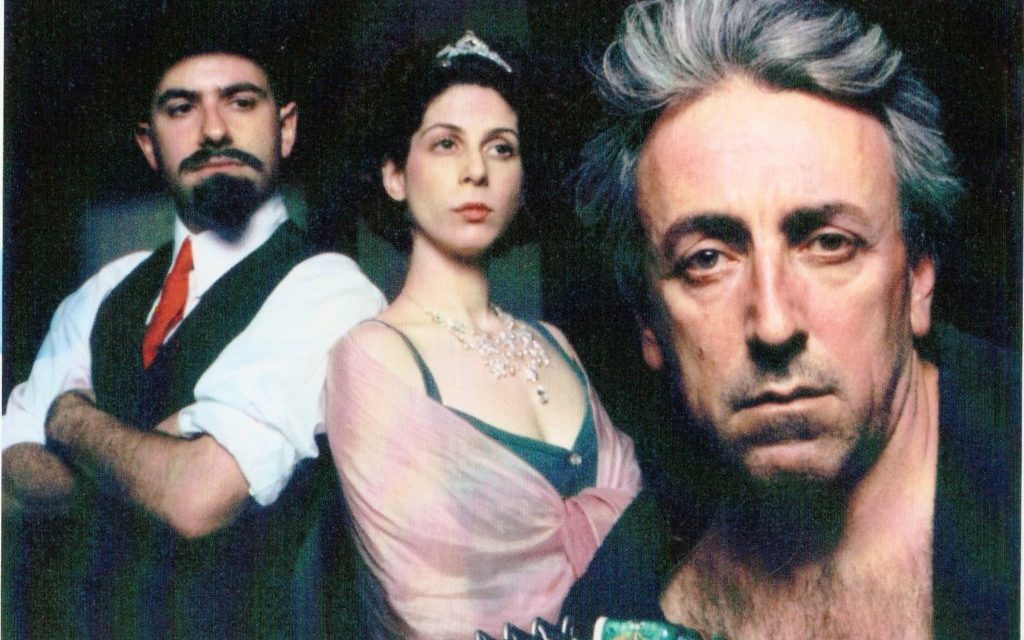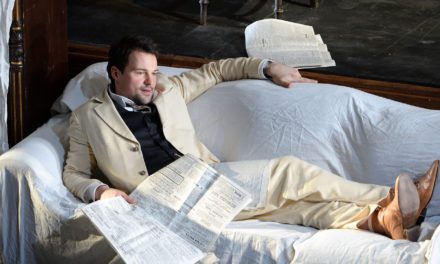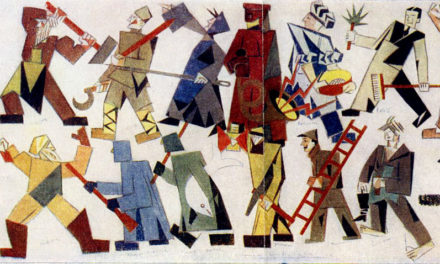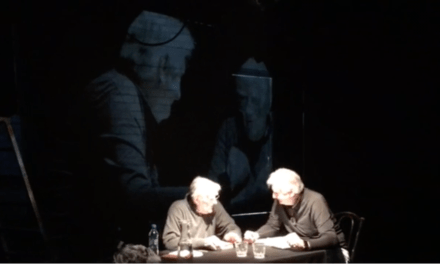Noah Birksted-Breen is the artistic director of London’s Sputnik Theatre Company, which he co-founded in 2005. Sputnik is dedicated to translating and producing contemporary Russian plays in Britain.
How did you come to the contemporary Russian theatre?
I studied Russian language and literature at high school. I enjoyed it and kept going. I studied Modern Languages, Russian, and French at Oxford University. In retrospect, it may look like there was a plan but there wasn’t! I just found that I enjoyed languages and was lucky enough to have Russian on offer at my high school (which is fairly rare)…I always enjoyed French but Russian resonated with me in a particular way. I had read Dostoevsky in English before I started learning the language, and that was one of my main reasons for choosing it. The more I learned, the more I became fascinated by the resilience of the Russian people in the face of great suffering as well as their passion and creativity. I also have distant family roots in Russia—great grandparents on one side of my family who left the Russian Empire in the early 1900s (modern-day Ukraine and Poland). The Russian language wasn’t passed down through the generations—they were probably native Yiddish speakers in any case. Still, it left some feeling of a distant connection with the region that I’ve always wanted to explore.
Why the focus on Russian theatre? How does it speak to British audiences?
People often ask me that question! From a Western perspective, it’s a niche interest. But arguably modern theatre started in Russia, with Chekhov, Stanislavsky, and Meyerhold. On top of that, Russia is the fifth largest country on earth, with a theatre sector funded far better than in most Western countries. So, to put it the other way around, why don’t all Western theatre directors go and train for a couple of years in Russia? In any case, I’m drawn to new Russian playwriting because it is formally inventive, experimental, and “political”—in other words, it finds artistically daring ways of considering the “big” subjects of the day. Russian drama is often very “dark” in its aesthetic. It doesn’t shy away from being unsettling, depressing, and uncomfortable, albeit with a great resilience of spirit shining through. My favorite British playwrights are also deeply challenging, but as a theatre culture, British theatre usually aims to please. In the UK, productions tend to offer a sense of catharsis and release at the end, whether with a tragic or happy ending. That often entails a didactic message, too. Many new Russian plays—particularly from the young generation of dramatists—leave the audience with a more unresolved narrative. This makes the work more challenging, even if more difficult to watch. I am particularly drawn to Russian absurdism, or rather the genre of “dark comedy,” which sits in an unresolved position between tragedy and comedy.
Can you speak a bit about your background in theatre? Do you work primarily as a translator or director?
For most of my life, I’ve worked as a director, mainly in studio theatres. From 2005 onward, I started translating new Russian plays as well, so that I could then stage those new works myself. Over the last couple of years, the balance has changed a bit. There are fewer translators in the UK than directors, by a long way, so I’ve begun collaborating with larger theatre companies and even a radio producer, who hire me as a translator. At first, I felt ambivalent about it. I’d like to be directing those plays myself! However, this approach has its advantages, too. I get to work alongside directors who are at the top of their game, and I can learn from them. Collaboration brings me new ideas about how to approach translation, too—and I have come to love translation as an art form, too, rather than just as a pragmatic requirement for gaining access to Russian plays. I also trained as a playwright with a master’s degree at Central School of Speech and Drama in 2003–2004, and I co-authored one play with Christine Bacon, called On The Record and produced by IceAndFire theatre company, which ran at the Arcola Theatre in 2011. So, gradually, I have come to see myself as a writer more than a director. After all, a translator is really just a writer—but that’s another conversation!
Can you share a favorite experience or a favorite play from your years of translating and directing Russian plays?
I tend to find that I “fall in love” with every play that I am translating! Of course, I only select plays that I like. But each play has its own individual character and artistic offerings. So, I feel a bit mean saying which one is my favorite! I have translated about fourteen Russian-language plays into English, to date. Now that I have made that disclaimer, I can perhaps stick my neck out and say that the play that I am working on now—Mikhail Durnenkov’s The War Hasn’t Yet Started—is one of my absolute favorites, and I mean from any country including British new playwriting. The War captures the zeitgeist—or perhaps I should say the neuroses—of the current era. It alludes metaphorically to the war in the Donbass, between the Ukraine army and Russian militants. Those with a specialist knowledge of the region can recognize certain real-life events, which it is referring to. But by avoiding cultural specificities, it speaks to Brexit and Trump and the difficult issue of sovereignty for Catalonia just as much. Or indeed any other highly divisive contemporary political issue that has emerged as a result of economic globalization and, more specifically, neoliberal capitalism. Its form is artistically rich and risky: twelve self-contained scenes that never refer to each other thematically in any way—and do not form an obvious whole. It is an impossible play! In the best possible way! Each scene is a vignette, which evokes a whole story. Each story depicts a dilemma from a particular life story or set of relationships. Maybe I’m being overly optimistic, but I hope this play will make a significant intervention in British theatre. I don’t mean it will transfer to the West End (which is mostly risk-averse). I hope many young British playwrights will come and watch it and be inspired by how daring it is possible to be, even when writing a three-hander for a studio theatre.
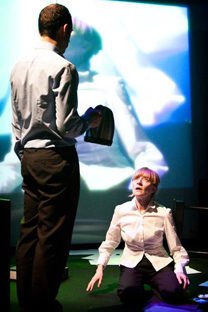
One Hour Eighteen Minutes, by Elena Gremina, Sputnik Theatre Company at the New Diorama Theatre in London, 2012. Photograph copyright Helen Warner. Posted with permission.
What changes have you observed in the Russian theatre landscape since you began your engagement with contemporary Russian theatre?
It seems to me that the “angry young men” of the 2000s, who created the New Drama movement, have given way somewhat to a more diverse range of movements, particularly the Urals School of Playwriting in Ekaterinburg (1000 miles or so east of Moscow). The latter is a gentler, more poetic, largely allegorical but still powerful movement. It is often less overtly political than Moscow-based New Drama, but still subversive in its aims. Because of the cultural conservatism sweeping across Russia, it is more difficult for New Drama playwrights to succeed outside of the small venues. Their more experimental, politicized texts are marginalized. It was never easy for them to cross over into the mainstream but there were limited opportunities—and fewer now. The Urals School is better suited to these turbulent times since their political messages are more “coded,” so they are still acceptable to larger audience bases. The playwrights may still gain productions in large repertory theatres across Russia, so the writers get royalties, which gives them a material base to keep working. The Urals School of Playwriting was founded by the Ekaterinburg-based playwright Nikolai Kolyada. He created a theatre in that regional capital city, as well as various annual play festivals. He also set up a university-based playwriting course in Ekaterinburg, and he published many anthologies with plays by younger dramatists from the local Urals region. So, his significance as a cultural figure should be noted for inspiring a younger generation of playwrights as well as materially helping many of them to reach recognition in their own right. Of course, there is still a “fire-brand” part of the movement, based largely at Teatr.doc, the studio theatre founded by a collective of dramatists in Moscow in 2002. Teatr.doc produces highly politicized, often documentary-inspired or verbatim work, which challenges state ideology and mainstream thinking, as well as supporting a younger generation of non-conformist writers. This venue has national and historical significance as a model of civic resistance through artistic practice.
COLLABORATION WITH BBC RADIO 3
You recently translated three newly commissioned plays, which were broadcast on BBC Radio 3 this month. Can you tell us about the plays and playwrights selected for this project?
So, I think it’s fair to say that most Russian playwrights conceive of their work in a different way to British (and perhaps American) ones. Writers in the UK are usually looking for topical relevance to their work. For example, in 2005, the British police killed an entirely innocent Brazilian man—Jean Charles de Menezes—two weeks after a London terror attack. It was a tragic overreaction—a sort of “panic” killing by the police who were watching a suspected “terrorist” and confused the two men, as the police later admitted. I believe that three plays came out about this incident in the following year. British theatre is in my DNA, and I love documentary theatre, so I admire this about theatre-makers in the UK—we want to try to speak about painful subjects, to articulate difficult memories that the authorities would like us to forget. Most Russian playwrights are less wedded to realism. I say that without judgment. They also capture the contemporary world—but not so much for its topical relevance. They want to offer an affective experience, to express how the contemporary era feels with its contradictions and painful realities at the social level. That’s what these three plays do, which were produced by Radio 3 in collaboration with Sputnik.
A Weekend In The Country by the Presnyakov Brothers imagines a man, Vitaly, who inherits a house one hundred kilometers from Moscow. This play depicts a Russia of the near future, where economic and social collapse is shaping the fabric of daily life. Vitaly sets up his newly inherited house as a place that people can rent to “recharge” themselves from city life. The twist is that they come for a particularly grisly experience: they have paid to have a victim, whom they can kill. Everything goes wrong in the play—the weekend guests are also killed. This is Tarantino meets Dostoevsky!
Tarantula by Ivan Andreev depicts a fictional elite school in Russia. What seems innocent to start with—a rebellion against the school’s student council by a particularly intelligent pupil—turns much murkier. The protagonist, Yan, turns out to be a conspirator—luring other children into his plan to commit mass murder. It becomes evident that he is working for an ultraconservative underground group. This work is a kind of thriller that investigates the theme of extreme political opposition.
Sweetie King by Irina Vaskovskaya is a romantic drama, which sees two “misfits”—a middle-aged man and a young woman—meet by chance in a bar. In fact, perhaps these lost souls have recognized something in each other—both have suffered traumatic losses. The man lost his daughter, while the woman lost her sister, to random violence by men who were never caught by the police. Against the backdrop of a violent and chaotic society, these two individuals discover a strange friendship, which might blossom into love.
None of these plays offer easy answers to the question “What is Russia today?” They simply point toward a suffocating climate, both politically and socially, in a country that embarked on such an optimistic post-Soviet journey just over twenty-five years ago.
Had you worked with any of these playwrights in the past? How familiar were you with their body of playwriting, and can you describe their style for us?
We invited ten playwrights to pitch ideas for this project, and we selected three to commission. I knew about half of the list personally—although not the ones whose work we ended up commissioning. The shortlist was composed based on the perceived talent of the writers, as well as a desire to have a list that represented men and women, as well as writers from different parts of Russia. I knew the work of Oleg and Vladimir Presnyakov (two real-life brothers writing as co-authors) already, although I hadn’t met them personally. I love their darkly humorous style, which contains sudden, unspeakable horrors, presented in a playful, almost kooky way. I approached them, and they agreed to pitch an idea, which we accepted. I came across Ivan Andreev’s work when he presented his play Chiwawa at the Lyubimovka, an annual play festival in Moscow, in 2014. I thought it was a superb play, so we invited him to pitch an idea. He writes in a bold, racy style. His plays are fast-paced and playfully inventive—usually dystopian. He seems to stare ahead into a grey zone where this world is headed if we don’t fix things quickly! Similarly, I’d read a play by Irina Vaskovskaya, Lessons Of The Heart, around 2014 or 2015, and suggested to the radio producer, Sasha Yevtushenko, that we invite her to pitch an idea. Irina writes dramas that plunge into the depths of difficult relationships, capturing the disturbing dependence of social “misfits.” Her characters try to communicate, but mostly they remain locked into their own inner worlds. The action occurs “between the lines.” Her work is reminiscent of Chekhov in some ways, but also Harold Pinter—one of the playwrights who has inspired her the most.
I feel pleased that we could offer a healthy diet of work, ranging from iconic and well-established writers (the Presnyakov Brothers) to younger, emerging talents (Ivan Andreev, Irina Vaskovskaya). All of the commissioned playwrights have a connection to Ekaterinburg. The Presnyakovs lived and worked there for much of their lives, while Andreev and Vaskovskaya both live and work there now. There’s a strong playwriting culture in Ekaterinburg, as I write about above, so it’s not as surprising as it may sound that Moscow ended up not being represented.
Can you talk about the production process for these radio plays?
I worked with the BBC radio producer Sasha Yevtushenko to create this evening of new Russian drama. My role was to put together a shortlist of playwrights to approach. Then we invited those ten writers to pitch ideas. We accepted three for a full commission of a new 30-minute play. Sasha and I worked alongside each other to support the playwrights in developing the scripts. Development was an extensive process, more intensive than I have experienced in theatre. Each play had between four and ten drafts! This involved fairly major rewrites. The BBC gets a mainstream audience—it is anticipated that between 120,000 and 200,000 will have listened to this evening of new Russian drama live (and potentially many more through the online presence of the plays). So Sasha and I had to do more work than would be necessary when producing a new play for a studio theatre, taking into account the conventions familiar to British listeners. The playwrights were impressive in their willingness to re-draft and not be dismayed by the idea of changing the plays, to various degrees, from their original drafts. I translated all the drafts as well as the correspondence between the playwrights and Sasha, so it was probably the most all-encompassing job I have done to date.
LOOKING AHEAD
What are your next translating or directing projects?
One of my next projects is to try to create a position for myself as “translator-in-residence” either at a major London theatre or—even better—as a freelancer who can spend time at a number of theatres across the UK. My idea is that many British theatres are interested in staging works from abroad, including Russia, but they have no idea how to access the plays from other countries. It also costs them money and takes lots of time. If I could convince a funder to pay for my time to be resident in various companies over several years, I could get to know their work and make “bespoke” suggestions. I feel that this would be one way of challenging cultural insularity, at a time when British theatres need to challenge their own artistic and ideological orthodoxies.
The other point is that if somebody donates a large sum of money to my company, Sputnik, I could start working immediately on a large number of projects! As a small company, the situation has probably never been worse—at least, in the last few decades, in terms of fundraising. I find strategic ways of getting around that, to some extent. For instance, I have worked with four major partner organizations in the last four years—the BBC, Theatre Royal Plymouth, and two British universities—so that helps. But nothing entirely replaces having a production budget to commission playwrights and produce new work. Here’s to hoping for some good fortune in the near future!
Can you tell us more about Sputnik’s ongoing partnership with Oxford University?
I entered a collaboration with Oxford in 2017. In fact, it’s a double collaboration because I am also working as a part-time researcher there, conducting research on contemporary Russian political playwriting. As a researcher, I will continue to investigate new Russian plays in order to write about Russian culture in academic papers and blogs. At the same time, Sputnik is collaborating with Oxford University on a program called Creative Multilingualism (Strand 4). The collaboration will involve, at a minimum, one major workshop that brings together theatre-makers and academics for a seminar at the university on the subject of new Russian playwriting. The workshop will include play readings and discussion forums. It will take place, most likely, in the spring of 2019. I hope this collaboration will also lead to a new theatre production by Sputnik.
What Russian (or Ukrainian) plays or playwrights are you eager to bring to British audiences next?
Where to start?! I’d love to commission some of the younger generation of playwrights—from the sorts of names that appear at the Lyubimovka play festival in Moscow and the Week of the Contemporary Play festival in Kyiv. To date, I have presented the work of six Russian or Ukrainian playwrights whose plays had never been seen in Britain. There is a new generation, whose work is calling out for staging. Sorry to be so elusive… I just can’t give away my trade secrets!
Fear And Loathing In Russia Today, Sputnik’s collaboration with BBC Radio 3, is available for listening online at the BBC website until December 11, 2017.
This post was written by the author in their personal capacity.The opinions expressed in this article are the author’s own and do not reflect the view of The Theatre Times, their staff or collaborators.
This post was written by Jessica Hinds-Bond.
The views expressed here belong to the author and do not necessarily reflect our views and opinions.

